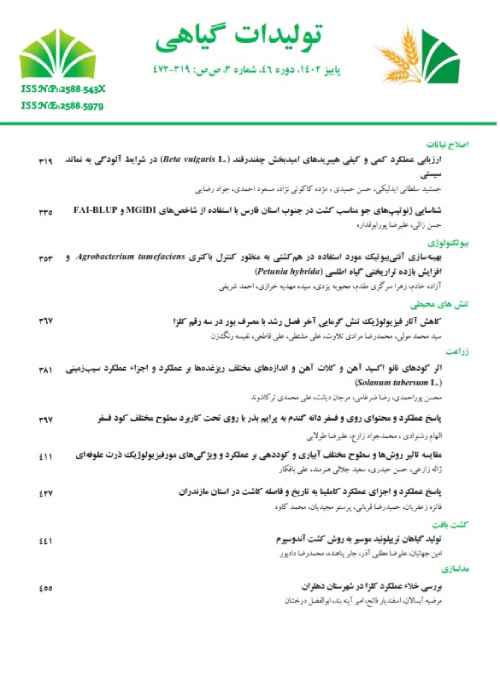The Effects of Ethylene and 1-MCP on Storability of Pomegranate Fruit cv. Malase Yosef Khani
Author(s):
Abstract:
Background And Objectives
Pomegranate is classified as a non-climacteric fruit, so it is considered as insensitive to ethylene. However, in some other non-climacteric fruit it has been shown that ethylene accelerates senescence or increase chilling injury symptoms during postharvest life. In this study, to determine the sensitiveness of pomegranate fruit to ethylene, the effects of ethylene and 1-MCP (as an ethylene inhibitor material) treatments were investigated on the pomegranate storability.Material and
Methods
Pomegranate fruit cv. Malase Yousef Khani was harvested at the ripening stage (full aril coloring) from an orchard near Saveh city, and treated following treatments; 2 μL/L ethylene for 48 hours, 1 μL/L 1-MCP for 24 hours, and 2 μL/L 1-MCP for 24 hours as well as a combination of 2 μL/L 1-MCP and μL/L ethylene treatments. Fruit without any treatment was put as control. The treatments were applied inside the polyethylene container. Then the treated fruits were stored at 4°C and 90% RH for up to 3 month. The fruits were removed from storage in 1, 2 and 3 months of storage and after 3 days keeping at room temperature as shelf life was analyzed. The experiment was conducted as a factorial based on a completely randomized design with 3 replications at Shahed University in 2016.Results
Results showed that ethylene treated fruits, as compared to 1-MCP treated fruit (even in presence of ethylene in combination treatment) had less fruit and aril marketability, as well as less firmness, ion leakage, total phenol content and antioxidant capacity, whilst this fruit had more weight loss than 1-MCP treated fruits. Ethylene treated fruit had also less fruit and aril marketability, and less antioxidant capacity than control fruit. The control fruit had less fruit and aril marketability, ion leakage, total phenol content and antioxidant capacity than 1-MCP fruits.Discussions
According to these results, pomegranate fruit was sensitive to ethylene and its postharvest loss, such as chilling injury symptoms, electro leakage, and antioxidants reduction was accelerated by presence of ethylene around the fruit. On the other hand, since in the most measured characteristics, control fruit had a lower quality than 1-MCP treated fruit, it seems that pomegranate is very sensitive to ethylene and even low level of internal ethylene is enough to accelerate the postharvest loss of this fruit. Therefore, removal of ethylene from the pomegranate storage, or using the anti ethylene materials such as 1-MCP can be effective in increasing posthrevst life of pomegranate fruit. Keywords:
Language:
Persian
Published:
Plant Production, Volume:40 Issue: 2, 2017
Pages:
25 to 36
magiran.com/p1739535
دانلود و مطالعه متن این مقاله با یکی از روشهای زیر امکان پذیر است:
اشتراک شخصی
با عضویت و پرداخت آنلاین حق اشتراک یکساله به مبلغ 1,390,000ريال میتوانید 70 عنوان مطلب دانلود کنید!
اشتراک سازمانی
به کتابخانه دانشگاه یا محل کار خود پیشنهاد کنید تا اشتراک سازمانی این پایگاه را برای دسترسی نامحدود همه کاربران به متن مطالب تهیه نمایند!
توجه!
- حق عضویت دریافتی صرف حمایت از نشریات عضو و نگهداری، تکمیل و توسعه مگیران میشود.
- پرداخت حق اشتراک و دانلود مقالات اجازه بازنشر آن در سایر رسانههای چاپی و دیجیتال را به کاربر نمیدهد.
In order to view content subscription is required
Personal subscription
Subscribe magiran.com for 70 € euros via PayPal and download 70 articles during a year.
Organization subscription
Please contact us to subscribe your university or library for unlimited access!


